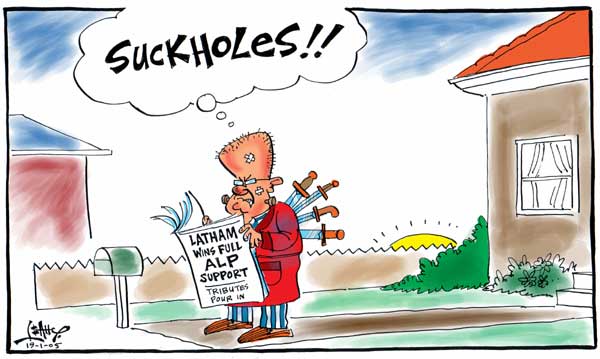January 19, 2005
executions and sovereignty
Latham's downfall is really an execution, a ceremonious public execution by the Australian Labor Party, that was conducted through the media He, as sovereign, was taken down by his colleagues and helped along by the media gorging on destruction.
The cartoonists understand the dark side of this:

Leahy
The figure is that of Mark Latham, the former federal ALP opposition leader.
What is most suprising is that this killing of a young leader whilst very sick (a life threatening illness?) was seen to be acceptable by both the ALP and the media. The normal sentiments and ethos about sticking knives into people's backs when they are sick did not apply in this case. Where is all the talk about evil, moral revulsion and intellectual distress amidst the political chatter?
Few have questioned the appearance of the demonic in this event. The commononm or consensual understanding in the media's formation of public opinion is that somehow Latham deserved the execution. It was a ritual of cleansing made acceptable by myth and ALP tradition.
Oh yeah. Don't you find this strange? Is sacrifice through political execution now so acceptable that we just accept it as normal? The exceptional has become the normal?
To explore this we need make a distinction between 'politics', which denotes the realm of partisan power struggles and is amenable to empirical research; and 'the political', which refers to alludes to the quasi-metaphysical realm, or the interwoven group of categories used in politics, that assign meaning and symbolic import to the political life; the former translates into policy, electoral and party politics, and the latter into the polity and democracy.
Sovereignty is the category that comes into play in this event. So what is going on here.
In The Accursed Share Part 111 Bataille understands sovereignty as having less to do with the power of states (eg., Jean Bodin's definition of sovereignty as the 'absolute and perpetual power of the republic') than with the power of killing.(p.197)
Bataille says that his understanding of sovereignty is linked to the denial of the sentiments that death controls. "Life beyond utility is the domain of sovereignty" states Bataille. By this he means that sovereign existence is the capacity to live in the present moment beyond the concerns for the needs to sustain life. Sovereignty "requires the strength to violate the prohibition against killing." (The Accursed Share p. 221).
Okay, okay. Taking out Latham is different from actual killing, as with the Aztecs, since Latham still have his life. And our capitalist society is organized around work, whilst Aztec society was organized around sacrfice. But the killing of Latham as leader of the ALP was excessive, beyond the dictates of utility, and it was an expression of the denial of the sentiments that death controls.
This understanding of sovereignty expresses what is not exhausted by law and convention. As Carl Schmitt observes sovereignty allways has the character of being beyond the law, and it can be referred to as danger, or 'extreme peril'; in fact, perhaps anything that confronts, undermines and destroys the rule of law.
Posted by Gary Sauer-Thompson at January 19, 2005 07:08 PM | TrackBack